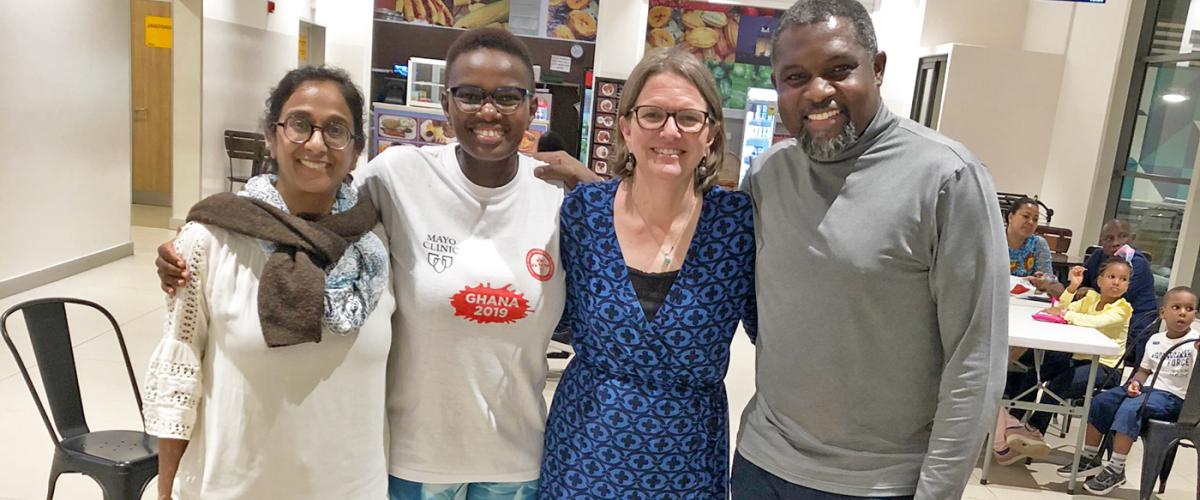Researcher Spotlight: Beth Virnig & Shalini Kulasingam
From left to right: Shalini Kulasingam, Waruiru Mburu, Beth Virnig, and John Amuasi in a restaurant in Ghana
The CGHSR Researcher Spotlight features global health researchers from the University of Minnesota and its partner sites.
UMN Researchers:
- Beth Virnig, MPH, PhD, Professor, School of Public Health
- Shalini Kulasingam, MPH, PhD, Professor, School of Public Health
Research Sites: Tanzania and China
In this researcher spotlight, Drs. Virnig and Kulasingam discuss their research experience as CGHSR Mentors and describe the global health research they have conducted together in recent years.
Q: What do you study?
Dr. Kulasingam: I study a mix of cancers and infectious diseases. Most of my focus however is on sexually transmitted infections, including human papillomavirus, which is the cause of cervical cancer.
Dr. Virnig: I am interested in the role of the healthcare system on care receipt and outcomes of care. I believe that many US-based researchers fail to understand that insurance and the general organization of healthcare is quite different in other countries and they may make assumptions that are not at all correct.
Q: Why do you think this research is important?
Dr. Kulasingam: Cervical cancer remains a leading cause of cancer death in women worldwide. We have vaccines and screening tests to reduce this burden in countries such as the U.S. but the degree to which these tools are available and used varies based, among other things, on a country's resources and other competing priorities.
Dr. Virnig: Without understanding the care context, it would be very easy to promote policies and strategies that will not align with the on-the-ground reality.
Q: Where do you conduct research?
Dr. Kulasingam: Until the pandemic, Tanzania and China.
Q: Why is it important for you to conduct research at international sites?
Dr. Kulasingam: The burden of the disease is much greater and the need for novel thinking and approaches that can address the barriers faced in some countries makes the research challenging but also interesting.
Dr. Virnig: I agree that with the burden of disease the need is very high. also, many us-based solutions will not apply or translate without some modifications to other countries. However, there are also many opportunities to learn from other settings and to perhaps promote asking whether the US way is the only way.
Q: What are examples of past student involvement in your research?
Dr. Kulasingam: I have had a student examine barriers to cervical cancer screening among HIV positive women in Guangxi China. Other students have examined risk taking behaviors in adolescents in Tanzania as well as infertility in Tanzania, respectively. Some of this research has been funded in part by the CCHSR. There are many opportunities for students to get involved, although with COVID the landscape is clearly more complicated. However, the issues that were in place before COVID remain relevant today.
7. What do you look for in a research trainee/mentee?
Dr. Virnig: I look for someone who is open to asking questions, who wants to learn new ways of doing things and who ultimately wants to make the world a better place.
Researcher Spotlights
Discover more about our other CGHSR Researcher Spotlights that feature global health researchers from the University of Minnesota and its partner sites.
If you would like your global health research to be featured in upcoming Researcher Spotlight series, please contact [email protected].
